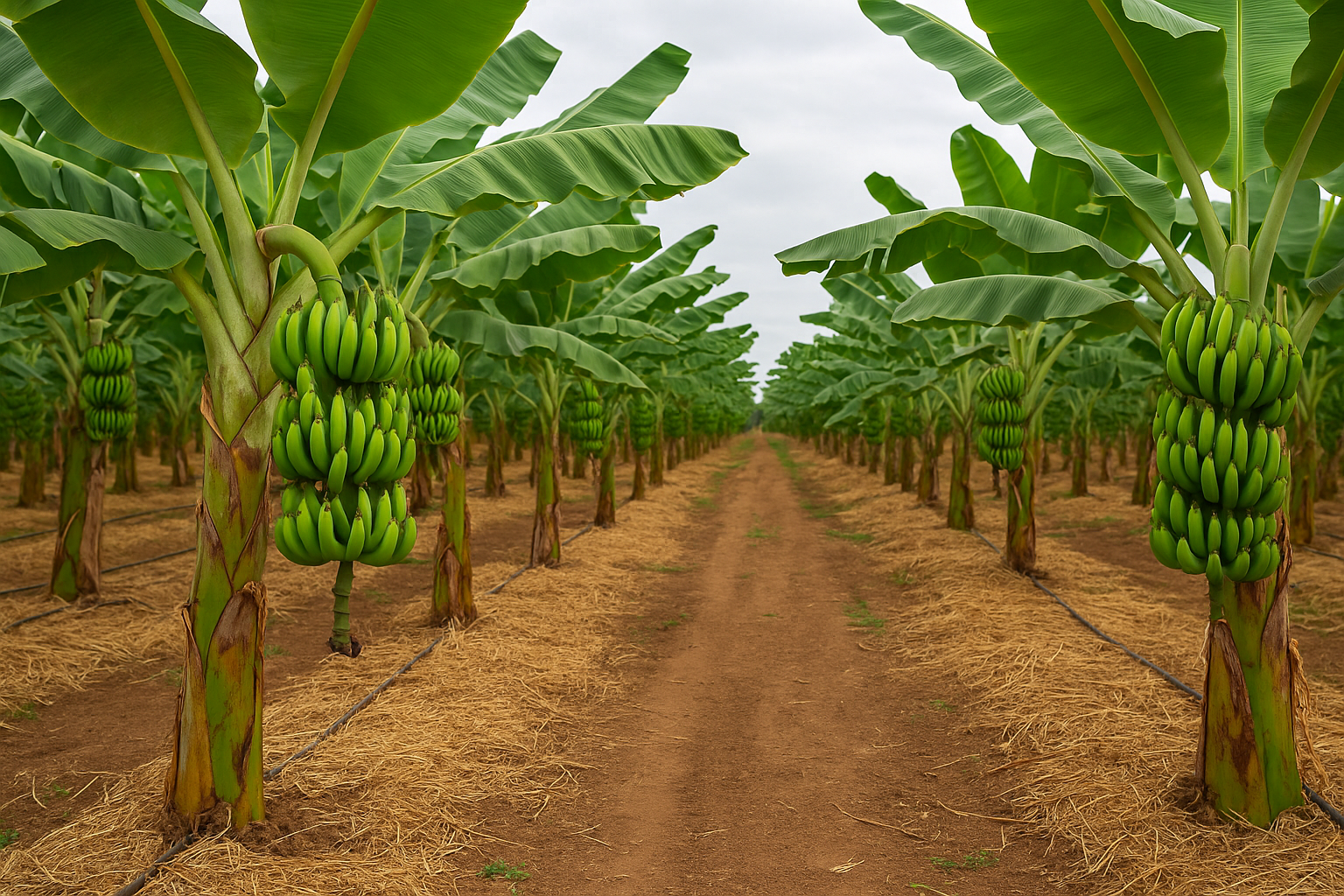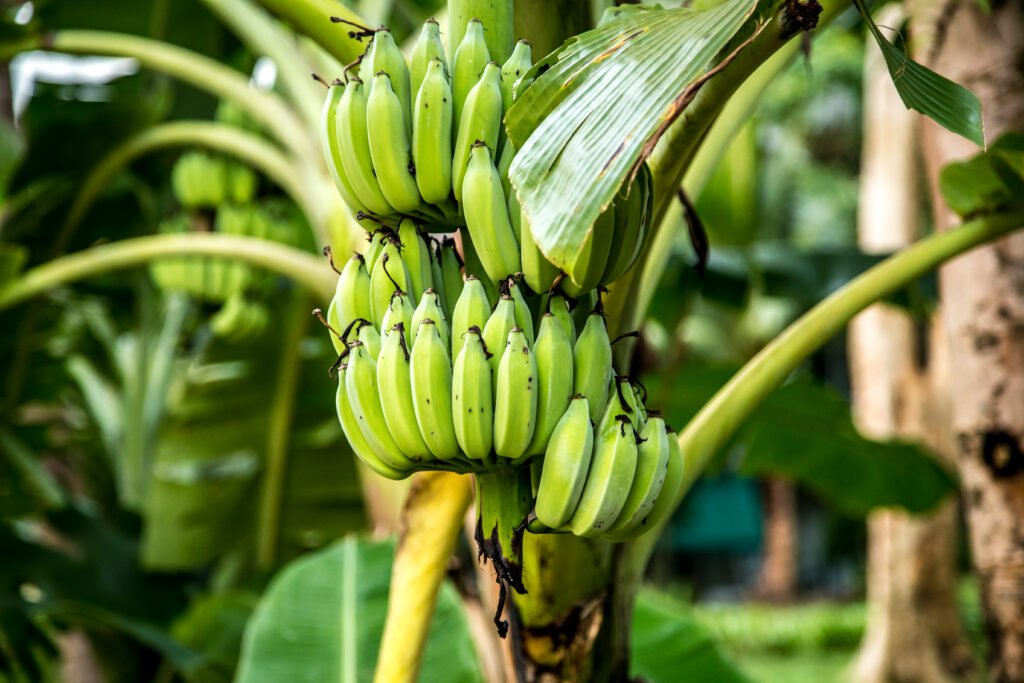Latest News
Organic Banana Farming in India 2025 | Best Practices, High-Yield Varieties & Market Outlook

Organic banana growing has gained attention due to the global trend towards healthier, more environmentally friendly food options. More farmers in India, where bananas are a key agricultural product and a staple food, are using organic farming practices to fulfil demand both domestically and abroad. Better pricing, more export possibilities, and sustainable agricultural methods that benefit farmers, customers, and the land are the outcomes.
The Reasons Behind India’s Boom in Organic Banana Farming
With more than 25% of the world’s banana production, India is the biggest producer in the world. The banana industry, which has historically relied on chemical inputs, is currently experiencing a green revolution. States such as Tamil Nadu, Maharashtra, Gujarat, and Andhra Pradesh are at the forefront of organic banana growing.

The following are the main causes of this change:
- Growing consumer demand in the US, Europe, and the Middle East for fruits devoid of chemicals.
- Improved export prices for bananas with organic certification
- Long-term water conservation and soil fertility
- Growing knowledge of the dangers conventional pesticides provide to human health and the environment
📈 Export Markets Fuelling the Increase in Demand
Organic bananas from India are becoming more and more well-liked in international markets, particularly in:
- EU nations (the UK, the Netherlands, and Germany)
- Gulf countries (Qatar, Saudi Arabia, etc.)
- Southeast Asia (Malaysia, Singapore)
More and more consumers are looking for food certified by Fair Trade, NPOP (National Programme for Organic Production), and Global GAP. These certificates guarantee residue-free production and adherence to sustainable agricultural practices, both of which are essential for global acceptability.
Organic bananas from India are sometimes marketed at 20-40% higher costs than conventionally produced kinds, particularly when included in contract farming agreements with exporters or grocery chains.

palm tree with green bananas
🧪 How are organic bananas grown differently?
In contrast to traditional banana farming, organic banana growing avoids synthetic chemicals and depends on:
- FYM and vermicompost
- Biofertilizers like Trichoderma, Azospirillum, and Pseudomonas.
- Neem-based insecticides, cowdung slurry, and fermented organic sprays
- Intercropping and mulching to keep the soil wet
- Drip irrigation along with natural insect and weed management
Varieties such as Grand Naine (G9), Poovan, and Nendran have demonstrated high adaptation to organic systems, with average yields of 20-25 tonnes per acre under optimal organic conditions.
🧑🌾 Institutional and Government Assistance
The Indian government and many state agencies provide assistance to encourage organic farming under:
- PKVY, or Paramparagat Krishi Vikas Yojana
- MOVCDNER stands for Mission Organic Value Chain Development.
- Assistance for certification and export promotion from the Agricultural and Processed Food Products Export Development Authority (APEDA)
- Funding provided by NABARD for organic infrastructure, such as composting facilities and certification fees
Farmer Producer Organizations (FPOs) and cooperatives are increasingly being encouraged to shift to organic fruit clusters, especially in banana belts of Gujarat and Madhya Pradesh.
Long-Term Benefits and Sustainability
In addition to commanding a higher price on the market, organic banana growing provides both economic and ecological resilience. Important long-term advantages include:
- enhanced structure and biodiversity of the soil
- Decreased reliance on imported chemicals
- Over two to three years, lower input costs
- Enhanced export brand value and traceability
- improved working conditions for agricultural labourers and farmers
🚀 What Does India’s Organic Banana Cultivation Future Hold?
India’s organic banana industry is expected to increase significantly due to growing demand. This trajectory is anticipated to be shaped by the following future trends:
- Increased use of blockchain technology to improve supply chain transparency
- More partnerships with foreign customers for contract farming
- Cold chain and export infrastructure investments
- The emergence of organic banana companies in India that cater to people that are health-conscious
- Utilising IoT and AI technologies to enhance yield forecast and traceability
If Indian banana producers embrace and uphold strict organic standards, they have a great chance to dominate this high-value market as more customers select sustainable, clean products.
🙋♀️ FAQs About Organic Banana Farming and Export
1. Is it profitable to grow organic bananas in India?
Yes, premium pricing, gradually declining input costs, and rising export demand have made cultivating organic bananas more profitable. Market access, quality assurance, and appropriate certification are essential for success.
2. Which banana type is ideal for India’s organic farming?
Grand Naine (G9) is the most widely used because of its high yield, appropriateness for export, and flexibility with regard to organic inputs. Robusta, Nendran, and Poovan are other good types.
3. Do ordinary bananas yield more than organic ones?
Organic bananas may produce somewhat less at first, but over the course of two to three years, yields frequently level off and become comparable—all the while enhancing soil health and cutting expenses.
4. How can banana growers obtain organic certification?
Under the NPOP guidelines, farmers can apply through certifying organisations that APEDA has authorised. Assistance is offered via programs such as PKVY.
5. Which nations purchase India’s organic bananas?
The demand for residue-free, sustainably farmed fruit is rapidly increasing in countries including Germany, the Netherlands, the United Arab Emirates, Saudi Arabia, the United Kingdom, and Singapore, which are top importers.





















